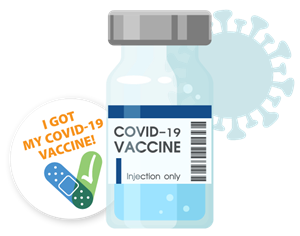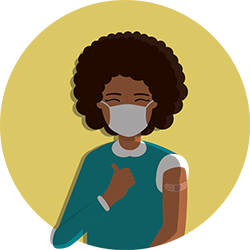Everyone 12 years of age and older is now recommended to get a COVID-19 vaccination. Get a COVID-19 vaccine as soon as you can. Widespread vaccination is a critical tool to help stop the pandemic. Read CDC’s statement.

- COVID-19 vaccines are safe and effective.
- You may have side effects after vaccination. These are normal and should go away in a few days.
- It typically takes two weeks after vaccination for the body to build protection (immunity) against the virus that causes COVID-19. You are not fully vaccinated until 2 weeks after the 2nd dose of a two-dose vaccine or two weeks after a one-dose vaccine.
- Learn how to find a COVID-19 vaccine so you can get it as soon as you can.
- People who have been fully vaccinated can start to do some things that they had stopped doing because of the pandemic.
- We are still learning how well vaccines prevent you from spreading the virus that causes COVID-19 to others, even if you do not have symptoms. Early data show that vaccines help keep people with no symptoms from spreading COVID-19.
- We are also still learning how long COVID-19 vaccines protect people.
- We are still learning how many people have to be vaccinated against COVID-19 before the population can be considered protected (population immunity).
- We are still learning how effective the vaccines are against new variants of the virus that causes COVID-19.
Availability of Vaccines
What we know
Vaccines are now more widely accessible in the U.S. Everyone ages 12 and older is recommended to get a COVID-19 vaccination.
Vaccines are now more widely accessible in the U.S. The federal government continues to work toward making vaccines widely available for everyone at no cost. Learn more about how COVID-19 vaccines get to you.
Many doctors’ offices, retail pharmacies, hospitals, and clinics offer COVID-19 vaccinations. Your doctor’s office or local pharmacy may contact you with information about their vaccination plans. Parents, check with your child’s healthcare provider about whether they will offer COVID-19 vaccination.
Find a COVID-19 Vaccine: Search vaccines.gov, text your ZIP code to 438829, or call 1-800-232-0233 to find locations near you.
Cost of Vaccines
What we know
The federal government is providing the vaccine free of charge to all people living in the United States, regardless of their immigration or health insurance status.
COVID-19 vaccination providers cannot:
- Charge you for the vaccine
- Charge you directly for any administration fees, copays, coinsurance, or the balance of the bill after appropriate reimbursement
- Deny vaccination to anyone who does not have health insurance coverage, is underinsured, or is out of network
- Charge an office visit or other fee to the recipient if the only service provided is a COVID-19 vaccination
- Require additional services in order for a person to receive a COVID-19 vaccine; however, additional healthcare services can be provided at the same time and billed as appropriate
COVID-19 vaccination providers can:
- Seek appropriate reimbursement from the recipient’s plan or program (for example, private health insurance, Medicare, Medicaid) for a vaccine administration fee
- Seek reimbursement for uninsured vaccine recipients from the Health Resources and Services Administration’s COVID-19 Uninsured Programexternal icon
Effectiveness
What we know
COVID-19 vaccines are effective at keeping you from getting COVID-19. After you are fully vaccinated, you can start doing some things you had stopped doing because of the pandemic.
Studies show that COVID-19 vaccines are effective at keeping you from getting COVID-19. Getting a COVID-19 vaccine will also help keep you from getting seriously ill even if you do get COVID-19.
COVID-19 vaccination is an important tool to bring you closer to enjoying the activities you have missed. Learn more about the benefits of getting vaccinated.
 COVID-19 vaccines teach our immune systems how to recognize and fight the virus that causes COVID-19. It typically takes 2 weeks after vaccination for the body to build protection (immunity) against the virus that causes COVID-19. That means it is possible a person could still get COVID-19 before or just after vaccination and then get sick because the vaccine did not have enough time to provide protection. People are considered fully vaccinated 2 weeks after their second dose of the Pfizer-BioNTech or Moderna COVID-19 Vaccine, or 2 weeks after the single-dose Johnson & Johnson’s Janssen COVID-19 Vaccine.
COVID-19 vaccines teach our immune systems how to recognize and fight the virus that causes COVID-19. It typically takes 2 weeks after vaccination for the body to build protection (immunity) against the virus that causes COVID-19. That means it is possible a person could still get COVID-19 before or just after vaccination and then get sick because the vaccine did not have enough time to provide protection. People are considered fully vaccinated 2 weeks after their second dose of the Pfizer-BioNTech or Moderna COVID-19 Vaccine, or 2 weeks after the single-dose Johnson & Johnson’s Janssen COVID-19 Vaccine.
You should keep using all the tools available to protect yourself and others until you are fully vaccinated. After you are fully vaccinated, you can start doing some things you had stopped doing because of the pandemic. Learn more about what you can do when you have been fully vaccinated.
What we are still learning
Scientists are still learning how well vaccines prevent you from spreading the virus. We’re also still learning how long COVID-19 vaccines protect people.
Although COVID-19 vaccines are effective at keeping you from getting sick, scientists are still learning how well vaccines prevent you from spreading the virus that causes COVID-19 to others, even if you do not have symptoms. Early data show that vaccines help keep people with no symptoms from spreading COVID-19, but we are learning more as more people get vaccinated.
We’re also still learning how long COVID-19 vaccines protect people.
For these reasons, people who have been fully vaccinated against COVID-19 should keep taking precautions until we know more, like wearing a mask in indoor public places, avoiding large indoor gatherings, and washing your hands often. Vaccinated people do not need to wear masks outside except in crowds.
Safety
What we know
COVID-19 vaccines are safe and effective. Vaccines cannot give you COVID-19. You may have side effects after vaccination. These are normal, and should go away in a few days.
Millions of people in the United States have received COVID-19 vaccines, and these vaccines have undergone the most intensive safety monitoring in U.S. history. This monitoring includes using both established and new safety monitoring systems to make sure that COVID-19 vaccines are safe. COVID-19 vaccines cannot give you COVID-19. Learn more facts about COVID-19 vaccines.
CDC has developed a new tool, v-safe, to help us quickly find any safety issues with COVID-19 vaccines. V-safe is a smartphone-based, after-vaccination health checker for people who receive COVID-19 vaccines. Learn how the federal government is working to ensure the safety of COVID-19 vaccines.
You may have side effects after vaccination, but these are normal
After COVID-19 vaccination, you may have some side effects. These are normal signs that your body is building protection. The side effects from COVID-19 vaccination, such as tiredness, headache, or chills, may affect your ability to do daily activities, but they should go away in a few days. Learn more about what to expect after getting vaccinated.
Population Immunity
What we know
Population immunity means that enough people in a community are protected from getting a disease because they’ve already had the disease or because they’ve been vaccinated.
Population immunity makes it hard for the disease to spread from person to person. It even protects those who cannot be vaccinated, like newborns or people who are allergic to the vaccine. The percentage of people who need to have protection to achieve population immunity varies by disease.
What we are still learning
We are still learning how many people have to be vaccinated against COVID-19 before the population can be considered protected.
As we know more, CDC will continue to update our recommendations for both vaccinated and unvaccinated people.
New Variants
What we are still learning
We are still learning how effective the vaccines are against new variants of the virus that causes COVID-19.
New variants of the virus that causes COVID-19 are spreading in the United States. Current information suggest that COVID-19 vaccines authorized for use in the United States offer protection against most variants. However, some variants might cause illness in some people after they are fully vaccinated if they are circulating in the community.
Clinical Resources: Toolkits and resources for handling, storing and administering the vaccine, including patient education materials.